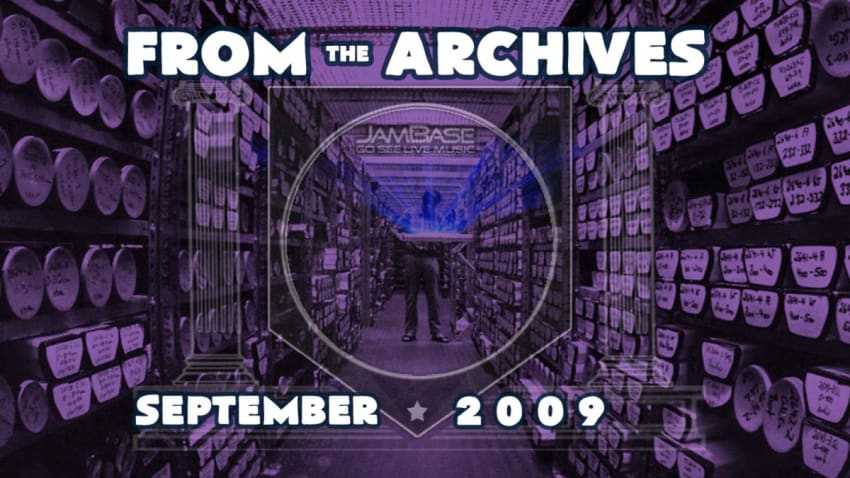BLK JKS: The End Of World Music
By Team JamBase Sep 15, 2009 • 6:33 pm PDT

 |
To be fair, BLK JKS don’t play just white music. It’s a heady mélange of everything relevant from the past two decades of African, European and American music, the type of eclecticism that everybody’s trying but that rarely comes across as passionately and naturally as the band’s just-released first international album, After Robots (released September 8 on Secretly Canadian). It’s an album that’s truly impossible to pin down with a genre tag, but it’s a blast picking out the precursors inside the performances just the same.
As you might suspect, the synergy didn’t happen overnight. An amoebic version of the group, consisting of lead singer/guitarist Lindani Buthelezi, guitarist/singer Mpumi Mcata, and a revolving cast of backing musicians began playing gigs around the turn of the century. “Me and Linda were just basically making noise,” says Mcata, the band’s de facto spokesman. “Tshepang [Ramoba, drums] and Molefi [Makananise, bass], before they joined us they were already playing in other bands – Tshepang in a jazz band, Molefi playing mostly more traditional African stuff. So, when the four of us found each other [we were] really passionate, ready to die for it, you know? That’s when it actually really happened. We just jammed, and it became this thing that it is.”
 |
Ramoba grew up on jazz and soul music. Miles Davis and John Coltrane constitute some of his earliest musical memories, and you can almost picture his clattering, rambunctious rhythms pacing a post-bop combo circa 1968. But he’s equally adept with a funky hustle or sweeping, epic rock textures. It’s no wonder Billboard named him the best musician at this year’s South by Southwest Festival.
Buthelezi, however, doesn’t come from a commercial music background, developing his craft via a more visceral, localized approach. “I remember going out with my mother, going out to clubs,” he says. “A lot of a cappella singing, learning different vocal techniques.” On record, his voice shifts readily from punchy rhythmic trills to a haunting moan that bears a striking resemblance to a young Justin Hayward (Moody Blues), singing in English as well as Zulu and Xhosa, using the textures of the languages as much as the words themselves to convey the melody.
The stable four-piece lineup had its first show together on June 16, 2004, and from there began to develop a following around South Africa, playing wherever they could get a gig. Things began to snowball in early 2007, when the group’s soon-to-be manager (and former Fader magazine Editor-in-Chief), Knox Robinson, caught wind of the band’s growing stature. “[He] was referred to us by Diplo, whom we met here in South Africa,” explains Mcata. “Through the grapevine, you know, word of mouth, he heard about us, MySpace, etc.”
 |
The band members took an open-minded approach when they went into the studio to record After Robots, collaborating with producer Brandon Curtis to create the final product; the Secret Machines frontman had also produced the band’s breakout Mystery EP. Most of the songs had existed in one form or another for years, but BLK JKS is not a band that writes a song and then leaves it alone. “It’s like giving birth to a baby,” says Buthelezi. “You need to take care of it.”
Following a marathon three and a half weeks of recording last winter, the band focused on touring, cobbling together a couple of short U.S. stints during the spring and summer. June 20 was a culmination of sorts, a celebration of a shared heritage, as BLK JKS joined Vieux Farka Touré onstage at the Highline Ballroom in New York. “It was really cool,” gushes Makananise. “Here [in Johannesburg], we grew up with his father’s music.” He’s referring to African blues guitar god Ali Farka Touré, who is sometimes referred to as the African John Lee Hooker.
“Another thing about that tour [was that] we found ourselves sandwiched between Femi Kuti and Vieux Farka Touré,” says Mcata. Kuti’s father, Fela, basically invented the Afrobeat genre and his influence on world music is incalculable. “It was quite something, thinking about the size of their fathers’ music legacies, their contributions to African culture.”
At this rate, BLK JKS are poised to contribute an impressive legacy of their own to the canon of African music.
BLK JKS are on tour now; dates available here.
JamBase | Borderless
Go See Live Music!
